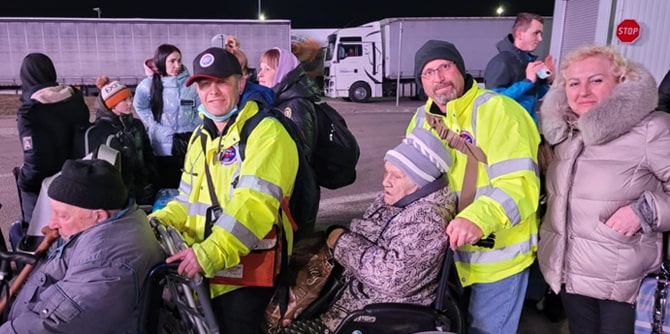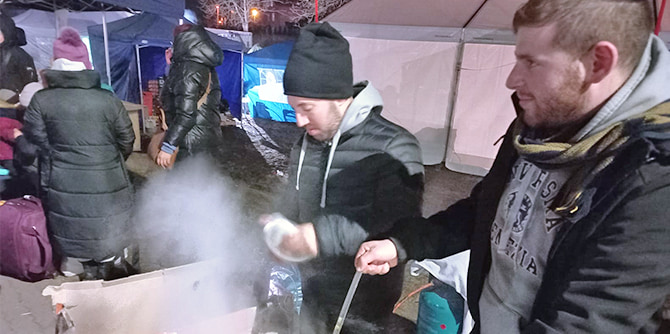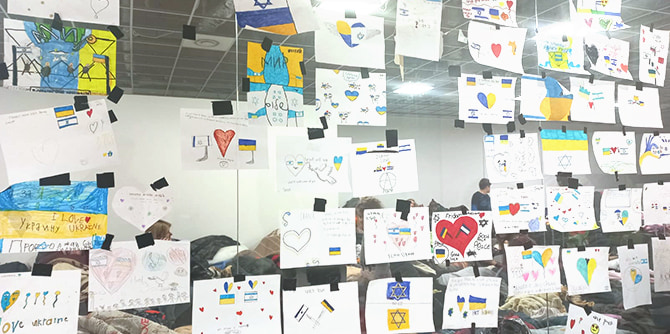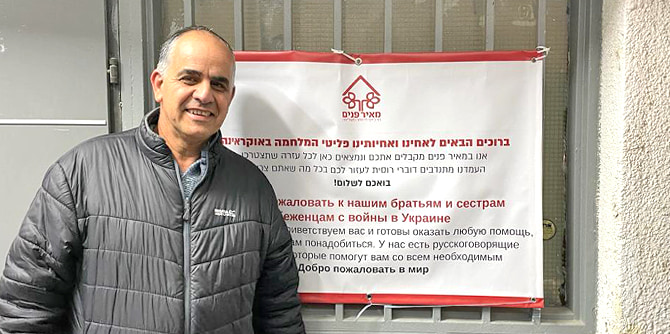Arik Mandelbaum: “You Can’t Be an Uninvolved Bystander”
Arik Mandelbaum, executive director of the Shiluv Center for psychotherapy and mindfulness training, is a graduate of Cohort 22 of the Mandel School for Educational Leadership. As the plight of Ukrainian refugees became known, he raised funds and travelled to Europe for a mission that included volunteering in a refugee camp in Poland and rescuing two Holocaust survivors in Lviv.
 Arik Mandelbaum with two Holocaust survivors brought out from Lviv (Courtesy)
Arik Mandelbaum with two Holocaust survivors brought out from Lviv (Courtesy)
“One evening, after I finished my shift as volunteer at Magen David Adom,” he explains, “I felt that I simply had to do something. I posted on Facebook that I would be setting out independently to help refugees, and I went to sleep. I woke up in the morning to tens of messages from people who wanted to help me with funding and with connections.”
Within a few hours, Mandelbaum had raised NIS 70,000, all of it dedicated to helping refugees, and was on his way to a refugee camp in Poland. He says: “Paradoxically, everything there looked beautiful and pleasant, but the circumstances were very difficult. Making children happy, if only for a few moments, was deeply unsettling: On the one hand, they arrived in the refugee camp and were received with smiles and warmth, but on the other, thinking about what they had been through was shocking.”
Given his medical background, Mandelbaum focused mainly on first aid. As an experienced educator and graduate of the Mandel School for Educational Leadership, he also assisted in creating alternative educational frameworks in the refugee camp.
“I thought I was a strong person, but during the first few days I constantly had tears in my eyes,” he said. “I couldn’t stop crying. We saw difficult things. On the surface, people didn’t look like refugees in terms of their clothing and demeanor, but then the realization struck that the plastic bag in their hand is everything they now have in the world.”
After Mandelbaum arrived in Poland, he was joined by
Orit Sommer, a graduate of Cohort 23 of the Mandel School, who also traveled independently. “When we arrived in Poland,” Mandelbaum reported, “we realized that nearly all the volunteers had come by themselves, without any organizational affiliation. This made the bureaucratic procedures much easier and made it possible to help quickly by buying strollers, medicines, blankets, and more.”
“The defining moment for me was the rescue of two Holocaust survivors who had fled from their home in Dnipro when the bombings started,” he continued. “We travelled to Lviv for a day to extract them and bring them to Poland. My medical training enabled me to be sure that they would have medical supervision during their arduous journey. Only after we had successfully brought them out from Ukraine did I realize that they were relatives of someone I had interviewed as a candidate to study at the Shiluv Center.”
Holocaust survivors are welcomed with song
All the volunteers I was with on my mission came as private individuals,” he said. “They included people with diverse views from different professional backgrounds, who came together to help in the humanitarian crisis in Ukraine regardless of religion, nationality, or gender. These were truly emotional and meaningful moments,” he said. “I believe that what I learned at Mandel guided me in this too, in simply getting up and taking action. You can’t be an uninvolved bystander; you have to act and do the right thing.”
Michael Muatti: Mapping the Needs of Refugees in the Field
Michael Muatti, a graduate of Cohort 5 of the Mandel Youth Leadership Program of the Mandel Leadership Institute, works at the HaShalem educational initiative in Jerusalem. In response to the crisis, he travelled to the Ukrainian-Polish border to provide support to refugees and map their needs so as to organize additional support by others.
“As part of an initiative organized by former emissaries to the Jewish Center in Kharkiv, which is operated by the OU and offers educational and Zionist activities to children and adults under the direction of Rabbi Shlomo Asraf” he reports, “I traveled to the Ukrainian-Polish border with two other emissaries. During the week we spent there, we aided refugees who had fled Ukraine, addressing various needs from providing them with basic equipment and helping them get oriented in a foreign country, to providing them with emotional support during their stay in Poland, to helping them with their documentation and the process of immigrating to Israel.”
 Serving soup in a refugee camp (Courtesy Michael Muatti)
Serving soup in a refugee camp (Courtesy Michael Muatti)
According to Muatti, the main goal of the journey was to map the needs of refugees in Poland, and to dispatch additional emissaries who could meet those needs. He and his colleagues spent time at the relevant border crossings and refugee camps, a hotel housing Jews in Lublin, and hotels run by the Jewish Agency in Warsaw. In light of the information they gathered, more emissaries were sent to provide humanitarian assistance at border crossings, and activities for children and adults were held at hotels. These included games, arts and crafts, singing, providing access to important information, and more.
“A central theme of our work in Poland was cooperating with various local organizations,” he explains. We worked with the Jewish Agency, the Joint Distribution Committee, Chabad, and other organizations operating at the local level. Cooperation is also ongoing in other countries, and involves government bodies and non-profit organizations in Israel active in immigrant integration, such as the Ministry of Aliyah and Integration, the Ministry of Welfare and Social Affairs, local authorities, youth movements, and a variety of NGOs. We are in constant contact with a large number of organizations, and the main goal is to provide a good level of service to as many people as possible as quickly as possible. In situations like these, the only way to succeed is by collaborating, without ego and without worrying about who gets the credit.”
 Drawings by Israeli schoolchildren express support (Courtesy Michael Muatti)
Drawings by Israeli schoolchildren express support (Courtesy Michael Muatti)
Nisim Elmakayes: Providing Food Security to Refugees in Israel
Nisim Elmakayes, the founder and director of the Meir Panim soup kitchen in Dimona, is a graduate of the Mandel Program for Regional Leadership in Yeruham and Ramat Hanegev of the Mandel Center for Leadership in the Negev. The soup kitchen that he runs in Dimona is part of a network of soup kitchens established in 2000 to help provide food security to thousands of needy people in Israel.
“When the crisis in Ukraine began,” he says, “I spoke to Benny Biton, the mayor of Dimona, with whom I am in close contact. I told him that Meir Panim was at his service and at the service of refugees from Ukraine. We put up a big sign at the entrance to Dimona, inviting anyone who needs help to come in and receive food packages, clothing, blankets, and anything else they need. So far, 12 Ukrainian families have come to Dimona, and many more families are expected to arrive soon. I have also invited the refugees to celebrate the Seder night with us.”
 Nisim Elmakayes and the sign welcoming refugees and offering them assistance (Courtesy)
Nisim Elmakayes and the sign welcoming refugees and offering them assistance (Courtesy)
Meir Panim is currently providing aid and support to families from Ukraine, and is involved in finding housing solutions for the refugees. The organization is also active in Tiberias, Jerusalem, and Or Akiva. “Wherever there are refugees, we are there,” says Elmakayes. “The Dimona branch, which I head, was the first to act to help refugees from Ukraine, and the other branches quickly joined the initiative. The refugees themselves have been amazed by the warm embrace they have received.”
Meir Panim operates in partnership with the International Fellowship of Christians and Jews, with Latet, a nonprofit organization that combats poverty and food insecurity in Israel, and Leket Israel – The National Food Bank. These partners provide some of the food packages that are distributed to the refugees.
Mandel Foundation Grants to Support Graduate Initiatives for Refugees and Immigrants in Israel
In order to bolster the capacity of graduates of the Mandel Foundation to aid Ukrainian refugees and immigrants, the Mandel Foundation issued a request for proposals for grants of between NIS 50,000 and NIS 100,000 for initiatives in Israel being operated by organizations either headed by Mandel graduates or in which Mandel graduates hold senior positions. These grants are also designated for initiatives that are promoting optimal integration of Ethiopian immigrants in Israel.
The Mandel Foundation–Israel is proud of its graduates and believes in their ability to lead change and to rise to human and social challenges, such as those that are currently presenting themselves.
